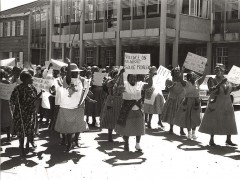South Africa: A Long Way South of Gender Equality

A quick glance over a few recent government-issued stats, and one could perhaps be excused at this point for opining that this article is out of touch; that it isn’t worth the metaphorical paper it’s printed on.
There are 178 women in South Africa’s 400-strong National Assembly. Women also comprise close to 50% of those in office at local government level; the three most prominent members of the Democratic Alliance, who currently govern the Western Cape, are women. Perhaps none of this is surprising in a country where more girls graduate from high school than boys and where surveys suggest that 50% of the population feel women are as well-equipped to hold powerful positions as men.
Unfortunately though, any celebratory back-slapping is at least a little premature. For in a Janus-faced South Africa still emerging from the cold shadow of an oppressive and segregationist apartheid regime, there is always another darker side to the story:
One in nine South African women have been raped at least once. One in four South African men admit to having committed rape, and close to half of those have raped more than one person. Some human rights organizations say that as many as 40% of South Africa’s women are likely to be raped in their lifetime, more than those who will complete secondary school. In 2010, more than 45,000 cases of domestic violence against women were reported in South Africa, just a little less than in the US, whose population is almost four times greater. It is estimated that between 40-70% of women murdered in South Africa are killed by their “intimate partner”.
And behind these statistics are the horrific individual stories, including the increasing trend of “corrective” rape cases (where it is believed that raping a lesbian will help “correct” her sexuality).
Then there was the video of a handicapped seventeen year old girl being gang raped by seven men in a Johannesburg township that quickly went viral in May this year.
Looking back a little further, in 2008 a girl was called a slut and sexually assaulted by a group of Capetonian taxi drivers at a taxi rank, all because she was wearing a short skirt on a night out.
The fact is that for any South African that occasionally opens his or her eyes, it is quickly apparent that the majority of their countryfolk still live a long way from the giddy heights of government offices and constitutional ideals of equality, cut off from ‘mainstream’ society in impoverished townships with minimal services and limited education. Conservative and strongly patriarchal beliefs often continue to carry considerable weight, and domination of women, in whatever form it might be manifested, is a way for men to gain respect or to assert a sense of power and ownership in an otherwise disempowered and deprived environment where drug and alcohol abuse are also common and further facilitate cases of sexual and domestic violence.
But before we dismiss gender inequality as an issue confined to the peripheral and often less-educated township dwellers, our very own central government requires further scrutiny. Last year our polygamous President Jacob Zuma, who has himself faced rape charges, appointed Mogoeng Mogeoeng as the country’s chief justice although it was widely publicised that Mogoeng had once said in court that rape was a “minor crime” and also ruled that a man who had dragged his girlfriend behind a moving car “deserved a second chance”.
Perhaps behind much of this is a culture of victim blaming. Many South Africans, even women, assume that if a woman has been attacked, beaten, or raped it is her own fault, that she either “asked for it” or didn’t do enough to prevent it. Some seem to feel that if women consider themselves fit to hold positions of substantial power, why should they not have to bear the burden of failing to keep the nation’s men in check? Boys will be boys after all.
This would go some way to explaining the often ambivalent attitudes shown by the police force and the justice system to cases of gender violence or sexual assault and thus the disparagingly low percentage of convictions (around 6% of all cases reported). Along with the social stigma that confronts women who have been raped, particularly if the contraction of AIDS is thrown into the bargain, it is not hard to see why many do not feel they can speak out about their experiences.
Activists seem to agree that the South African leadership needs to encourage open dialogue on and nationwide examination of attitudes to women and gender inequality, mirroring the approach to racial inequality in the aftermath of apartheid. For while South Africa’s liberation struggle surged on to the sounds of cheering crowds, it seems that somewhere along the line the nation’s women, despite having played such an important role in that struggle, got left behind, their voices drowned out by all the noise. It is perhaps fitting then that whilst the rest of the world celebrates International Women’s Day every March, South Africa’s national Women’s Day in August is still a fair way off.
Christopher Clark is a member of Global21, a student-run network of international affairs magazines and a partner of FutureChallenges.
Tags: Africa, developing countries, education, human rights, women

